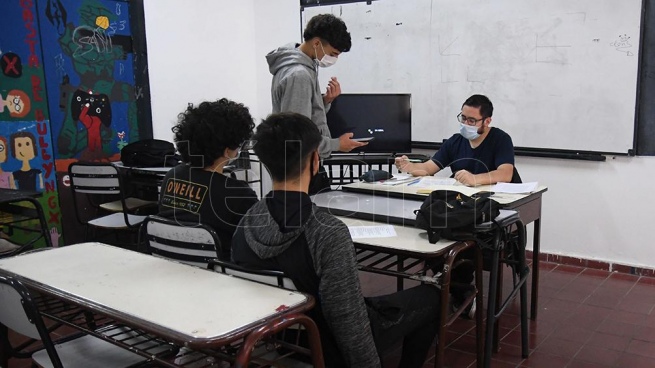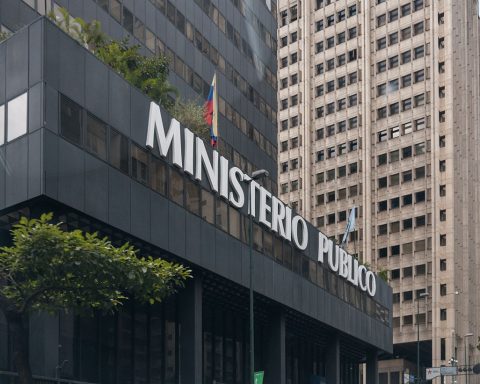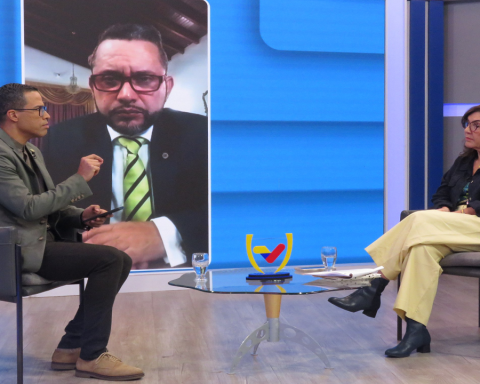The Government of the Autonomous City of Buenos Aires prohibited that in its schools is used in official documents and that teachers teach curricular content written with inclusive language As “one more measure” in the face of the low results obtained in Language by Buenos Aires students carried out by the CABA after the pandemic, it was officially reported.
In Circular 4/2022 the Buenos Aires Ministry of Educationled by Soledad Acuña, ordered teachers to carry out teaching activities and carry out institutional communications “in accordance with the rules of the Spanish language, its grammatical norms and the official guidelines for its teaching”.
And he clarified that this measure “applies only to the contents dictated by the teachers in class, to the material that is given to the students and to official documents of the educational establishments.”
In its rationale for prohibiting the use of “e”, “x” and “@” the Government of CABAled by Horacio Rodríguez Larreta, highlights that the results in Language obtained by students in the evaluations carried out after the pandemic “are not good” and that in “reading comprehension we have a setback of almost 4 years”.
He listed that he extended the school calendar, added class hours, schools were opened on Saturdays, new teacher training was provided, a reading fluency plan was started and that these measures are added to the regulation of the use of the “e”, “x” and “@” by teachers.
“It is a measure to facilitate the way in which our boys and girls learn and acquire the language,” highlighted the Buenos Aires portfolio in its resolution, adding “the Spanish language offers many options to be inclusive without the need to distort the language, or add complexity to reading comprehension and fluency.
He specified that the Royal Spanish Academy, in the report on inclusive language and related issues, has maintained that “the use of the @ or the letters «e» and «x>> as supposed marks of inclusive gender” is alien to the morphology of Spanish”, and that “it is the primary task of the educational system to promote the development of oral language and provide basic reading and writing knowledge and skills (…)”, while citing similar experiences in France and Uruguay.
About, Silvia Ramirez Gelbes, director of the Master’s in Journalism at the University of San Andrés, stressed that “it is understood that language academies are opposed to inclusive language since their function is to maintain the supranational unity of the language”.
“What seems a little more strange to me is that it is prohibited or imposed, because those who use it, use it. Just as they use the masculine article with the word “at” (which has a feminine article) or say “I think that” when the correct form is “I think that”, said the specialist.
And added that “those who do not use it, even if it is imposed on them, do not use it” .and wondered “if the use of inclusive language has been shown to affect literacy in any way. Nobody believes that the results of these tests are due exclusively to the appearance of these replacements.”
While Celeste Mac Dougall, CABA professor and specialist in comprehensive and inclusive sexual health, indicated that “thinking that inclusive language is an obstacle to learning is a very limited view, the use of this language is a window of possibility for countless of contents, not only of ESI, but of how social language is constructed”.
“In terms of improving educational quality, a ban never brings anything interesting, the Ministry’s resolution must think of alternatives in the approach, not in prohibitions that aim at openness of thought. The use of this language exploded in schools and those institutions are a place of possibility.
For your part Flavio Buccino, teacher and specialist in educational management, told Télam that “I do not find a causal relationship between inclusive language and the results of a test. The school teaches standardized, official content. Officially there is no inclusive language and it cannot be prohibited. teach something that does not officially exist”.
“An idea of making a resolution prohibiting this does not agree and I do not think that the justification is a language evaluation either. If this language is used, teachers should not promote it, they promote norms, rules, what is law and inclusive language does not is standardized” said Buccino.
Meanwhile, the FIT legislator and leader of the Ademys union, Amanda Martín, stressed that “it turns out that now the Ministry of Education is going to dedicate itself to persecuting whoever uses the ‘gender marks’@, X, e, because they are a mirror of a supposed ´gender ideology´. Acuña to the Bolsonaro tries to prohibit the inclusive language, but it is not going to achieve it”.


















